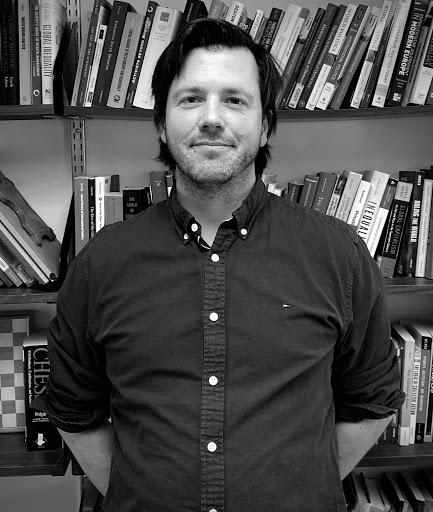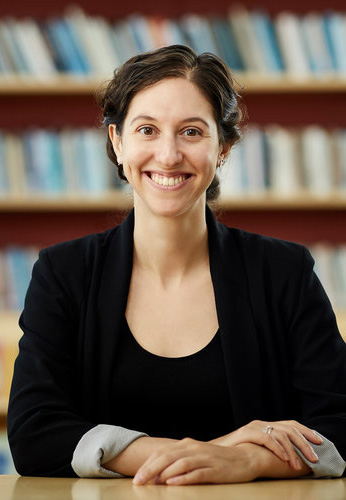 Nicolas Ajzenman
McGill University
Department of Economics
Nicolas Ajzenman is an Assistant Professor at McGill (Economics Department) and an affiliated professor at J-PAL and IZA.
He is working at the intersection of development economics, behavioral economics, and political economy. His research has appeared or is forthcoming in top scientific journals such as the American Economic Journal.
| |
 Vincent Arel-Bundock
Université de Montreal
Department of Political Science
Vincent Arel-Bundock is an Associate professor at the Department of Political Science at Université de Montréal, where he teaches comparative and international political economy. He is particularly interested in the politics of international taxation and foreign direct investment, but he has also worked on economic voting, monetary policy, foreign aid, and research methods.
| |
 Leonardo Baccini
McGill University
Department of Political Science
Leonardo Baccini is an Associate Professor in the Department of Political Science at McGill University. His research interests are in the area of international political economy and comparative political economy with a focus on the political effects of structural economic transformations.
| |
 Frédérick Bastien
Université de Montreal
Department of Political Science
Frédérick Bastien is an Associate Professor of Political Science at Université de Montréal. His work focuses on Political Communication and Journalism. He is particularly interested in the use of social media and the internet in politics. His research makes use of a variety of methods including, but not limited to, public opinion surveys and content analysis. Professor Bastien is currently involved in a project investigating the ideological leanings of Canadian media outlets.
| |
 Laurie Beaudonnet
Université de Montreal
Department of Political Science
Laurie Beaudonnet is an Assistant Professor of Political Science and the Jean Monnet Chair (Projet Euroscope) at Université de Montréal. Her research centers around the fields of political behaviour and public opinion in the European Union, more specifically towards European integration and anti-Roma attitudes. Professor Beaudonnet uses a variety of quantitative methods in her research on European citizens' attitudes, such as public opinion surveys and voter studies.
| |
 Éric Bélanger
McGill University
Department of Political Science
Éric Bélanger is Professor of Political Science at McGill University. He is also a member of the Royal Society of Canada’s College of New Scholars, Artists and Scientists. Though centered around Quebec and Canadian politics, his research focuses on the general themes of political parties, public opinion, and voting behaviour using a variety of quantitative methods. Some of his prior research has been concerned with economic voting and Quebec provincial elections. He is also involved in research projects studying voting behaviour in Latin America, as well as a comparison of nationalism in Quebec and Scotland.
| |
 Elissa Berwick
McGill University
Department of Political Science
Prof Berwick’s interests span the sub-fields of comparative politics and quantitative methodology. Her research focuses on sub-state nationalism, exploring how the imagined communities of stateless nations mold actual political attitudes and behaviors.
| |
 Antoine Bilodeau
Concordia University
Department of Political Science
Antoine Bilodeau is an Associate Professor of Political Science at Concordia University. He specializes in the study of immigrant integration and attitudes toward immigration and ethnocultural and religious diversity. In addition, Professor Bilodeau is a co-investigator on the Canadian Network for Research on Terrorism, Security & Society, a SSHRC-funded partnership grant, and the winner of a 2016 Concordia University Research Award.
| |
 Lisa Birch
CÉGEP Champlain-Saint-Lawrence
Department of Political Science
Lisa Birch is an associate professor in the Department of Political Science at Université Laval and a professor at CÉGEP Champlain-Saint-Lawrence. Co-founder of the Polimètre, she is interested in the fulfilment of electoral promises, public policy analysis, the dissemination of research and the development of young researchers. She is responsible for running the Polimètres within the Centre d'analyse des politiques publiques at Université Laval and for collective works on the governments of Canada and Quebec.
| |
 André Blais
Université de Montreal
Department of Political Science
André Blais is a Professor of Political Science at Université de Montréal. As a specialist in the study of elections, he has interests in the fields of voting behaviour, public opinion, electoral systems, and political participation. As well as exploring the behaviour of voters and parties during 26 elections held in 5 countries through the Making Electoral Democracy Work (MEDW) Project, Professor Blais also researches the comparative behaviour of voters and parties in the context of regional, national, and European elections. His work makes use of a variety of quantitative methods, such as surveys and experiments. He is the Chair of Electoral Studies at Université de Montréal.
| |
 Marc A. Bodet
Université Laval
Department of Political Science
Marc André Bodet is an Associate Professor at Université Laval, specializing in Quebec and Canadian politics in a comparative perspective. His research explores political parties and elections through various techniques of quantitative analysis, such as surveys and official electoral results. Currently, he is collaborating on research concerning the role of citizens in a responsive and responsible democracy.
| |
 Joanie Bouchard
Université de Sherbrooke
École de politique appliquée
Joanie Bouchard is an assistant professor at the School of Applied Politics at the Université de Sherbrooke. She specializes in the study of political psychology, electoral behavior, and Canadian politics. She is particularly interested in issues of political representation and discrimination related to gender, ethnicity, sexual orientation, migration status, and age. Her research employs a mixed methodology combining quantitative, qualitative, and experimental methods.
| |
 Colette Brin
Université Laval
Department of Communication Studies
Colette Brin is a Professor at Université Laval and Director of the Center for the Study of Media (Centre d'études sur les médias). A former journalist, she remains closely connected to communities of practice in journalism and communication; her current research explores the transformations underway in this field. Additionally, Professor Brin is carrying out work on the role of digital news in Canada, as well as on local and regional media in Quebec. She uses diverse research methods, especially content analysis, qualitative interviews, surveys and ethnographies of media production.
| |
 Emmanuel Choquette
Université de Sherbrooke
Département de communication
Emmanuel Choquette is an assistant professor in the Department of Communication at the University of Sherbrooke. His work focuses on political communication, discursive strategies, social cohesion issues and humour studies. He has conducted post-doctoral research aimed at developing effective communication strategies to combat hate speech. He is also interested in the representation and 'negative stereotyping' of cultural and religious minorities in the public space, through humorous discourse in particular.
| |
 Jeremy Clark
Concordia University
Institute for Information Systems Engineering
Jeremy Clark is an Assistant Professor at Concordia University. He is a specialist in software engineering, with a particular interest in internet voting security and network security protocols through the use of algorithms, network analysis, and computer systems. Professor Clark is the principal investigator of a research project on online services for private users and blockchain technologies as a possible tool for political parties.
| |
 Simon Coulombe
Université Laval
Department of Industrial Relations
Simon Coulombe is an associate professor in the Department of Industrial Relations at Université Laval. He holds the Chaire de recherche Relief en santé mentale, autogestion et travai. Trained in community psychology (PhD from UQAM obtained in 2016), he conducts research on the promotion of positive well-being and mental health recovery among workers from various marginalized groups, including people living with mental health difficulties and those in precarious employment situations. His work lies at the intersection of industrial relations and several fields of psychology (community, positive, environmental and organizational). He is also interested in the feeling of social contribution and social participation as factors of health and well-being, in addition to working on the development of digital applications useful in social sciences and health promotion. Before joining Laval University, he was an assistant professor in psychology at Wilfrid Laurier University, where he contributed to research on the well-being and inclusion of LGBTQ+ people.
| |
 Ruth Dassonneville
Université de Montreal
Department of Political Science
Ruth Dassonneville is an Assistant Professor at the Department of Political Science at Université de Montréal. Ruth also holds the Canada Research Chair in Electoral Democracy. She is primarily concerned with public opinion and voting behaviour. More specifically, Professor Dassonneville is interested in the causes and consequences of electoral dealignment. She makes use of a variety of quantitative methods, such as multi-level modelling and longitudinal analysis. For example, her current projects focus on how dealignment affects parties' behaviour and ideological positions.
| |
 Roxane de la Sablonnière
Université de Montreal
Department of Psychology
Roxane de la Sablonnière is a Professor of Psychology at Université de Montréal. An expert in social psychology, she is particularly concerned with the processes of social change on individuals. Her research explores individuals' cultural identities, as well as ethnic and intercultural relations. Her previous research has looked at diversity policies such as multiculturalism, interculturalism, and secularism. Professor de la Sablonnière's current endeavours are centered around exploring social change in Inuit communities.
| |
 Arnaud Dellis
UQÀM - Université de Québec à Montréal
Department of Economics
Arnaud Dellis is a Professor in the Department of Economics at UQÀM. Using game theory and experimental economics, his research examines the economic implications of electoral system reform. He is also interested in questions of information provision by interest groups and its effect on the quality of public policymaking. Professor Dellis is also a co-investigator on research that looks at the effects of taxation and social programs on economic efficiency and distributive justice.
| |
 Shannon Dinan
Université Laval
Department of Political Science
Shannon Dinan is assistant professor in the Department of Political Science at Université Laval. Her research focuses on public policy and finance, with a particular emphasis on public investment and the management of welfare state policies. Her recent work analyses the role of employers in the adoption of training and skills development policies, as well as social and employment policies aimed at populations in precarious situations.
| |
 Marina Doucerain
UQÀM - Université de Québec à Montréal
Department of Psychology
Marina M. Doucerain is an associate professor of social and cultural psychology at UQAM, where she heads the Culture, Identity and Language research laboratory. Her research focuses on relations between people from different ethno-cultural groups - social interactions and social networks in particular. She focuses on the different forms of contact that people from immigrant backgrounds form in mainstream society and on their cultural integration in their new society. Marina Doucerain received her doctorate in social sciences (cultural psychology and applied linguistics) from Concordia University, and then completed a post-doctoral fellowship at the Université du Québec à Montréal.
| |
 Yannick Dufresne
Université Laval
Department of Political Science
Yannick Dufresne is an Assistant Professor of Political Science at Université Laval. His research interests include the study of public opinion, electoral studies, political psychology and political communication. His research projects focus on the democratic processes and political strategies in the Big Data age. He holds the Chair of Leadership in Education in the Digital Social Sciences.
| |
 Claire Durand
Université de Montreal
Department of Sociology
Claire Durand is a Professor in the Department of Sociology at Université de Montréal. An expert in survey methodology, she studies the impact of methods used on the quality of electoral polls forecasting. She also works on developing methods that allow for analyzing combined databases. In that field, she studies the evolution of institutional trust in the world. She is also interested in statistics relative to First Nations and their social impact. She has been president of the World Association for Public Opinion Research (WAPOR) in 2017 and 2018. Keywords
Survey Research; Quantitative Methods; Multi-level Models; Measures; Electoral Polls; Institutional Trust.
| |
 Dominic Duval
UQÀM - Université de Québec à Montréal
Department of Communication Studies
Dominic Duval is a professor at the Département de Communication Publique et Social at UQAM. His research interests and expertises include political communication, research methods in social sciences, quantitative methods, and public opinion. His doctoral thesis, entitled "Les promesses électorales: mise en oeuvre, perceptions et couverture médiatique", is composed of three articles related to electoral pledges in Canada.
| |
 Aaron Erlich
McGill University
Department of Political Science
Aaron Erlich is an Assistant Professor of Political Science at McGill University. His research interests concern questions of democratization, information dissemination, political behavior, political participation, and public opinion in the Former Soviet Union, Eastern and Southern Africa, and Mexico. Professor Erlich's research makes use of a variety of methods, such as field experiments, survey experiments, and mixed-method research designs.
| |
 Benjamin Forest
McGill University
Department of Geography
Benjamin Forest is an Associate Professor at McGill University in the Department of Geography as well as an Associate Member of the Department of Political Science. A specialist in the field of political geography, his work revolves around the theme of diversity and electoral reform. In addition to being part of a project studying monuments and memorials in the post-Soviet sphere, Professor Forest is currently heading a project on diversity in party structures and constituencies in Canada. He is also working on research exploring municipal LGBTQ policies.
| |
 Patrick Fournier
Université de Montreal
Department of Political Science
Patrick Fournier is a Professor in the Department of Political Science at Université de Montréal. His research interests focus around the theme of political psychology, notably political behaviour, citizen competence, and opinion change. In addition to being the principal investigator of the 2011 and 2015 Canadian Election Study, he is also the principal investigator of a research project on reactions to negativity.
| |
 Francois Gelineau
Université Laval
Department of Political Science
François Gélineau is a Professor of Political Science at Université Laval. A specialist in Latin American politics, his reserach interests revolve around questions of voter turnout, electoral accountability, economic voting, and public opinion. Some of his prior research has looked at how the Michigan model of voting behaviour applies to Latin America. Professor Gélineau also holds the Research Chair on Democracy and Parliamentary Institutions at Université Laval.
| |
 Thierry Giasson
Université Laval
Department of Political Science
Thierry Giasson is a Professor of Political Science at Université Laval specializing in Political Communication. He studies online electoral campaigns and civic communication, political marketing as well as the mediatization of politics. He is currently carrying out research on digital citizenship and emerging online forms of political communication. Professor Giasson is also the lead investigator of the Research Lab on Political Communication (GRCP).
| |
 Jean-François Godbout
Université de Montreal
Department of Political Science
Jean-François Godbout is an Associate Professor of Political Science at Université de Montréal. He studies political institutions in Canada from a comparative perspective and is mainly interested in legislative behaviour. He is currently carrying out research on analysing legislative speeches in the Parliament of Canada. He is one of the editors-in-chief of the Canadian Journal of Political Science and is Director of l'Observatoire des fédérations, a research unit of the Centre d’études et de recherches internationales de l’Université de Montréal (CÉRIUM).
| |
 Allison Harell
UQÀM - Université de Québec à Montréal
Department of Political Science
Allison Harell is a Professor of Political Science at UQÀM. She specializes in political behavior and public opinion in industrialized democracies. More specifically, she is interested in the implications of ethnocultural diversity and gender on citizenship. She has recently been working on research on psychological orientations to politics, on the role of values in multiethnic contexts, as well as young people's reactions to changes in ethnic and religious diversity. Her research combines traditional survey techniques with experimental methods. Professor Harell is also the UQÀM Chair of Research in Political Psychology of Social Solidarity (CPPSS).
| |
 Virginie Hébert
UQAR - Université du Québec à Rimouski
Centre Urbanisation culture société
Virginie Hébert is an assistant professor at the INRS-Centre Urbanisation Culture Société and a member of the UMR INRS-UQAR on digital transformation in support of regional development. She is currently conducting research on social inequalities and communication, cultural and linguistic issues related to digital technology. Her work has also focused on the process of constructing and framing public problems. She has also collaborated on research into online disinformation, the digital maturity of media companies and the simplification of communications in the digital age.
| |
 Eric Hehman
McGill University
Department of Psychology
Eric Hehman is an Assistant Professor of Psychology at McGill University and director of the Seeing Human Lab.
Generally, Dr. Hehman’s research examines how individuals perceive and evaluate one another across group boundaries (e.g., race, gender, sexual-orientation, occupation, etc). To address these questions, he takes a multi-method approach, incorporating a broad range of behavioral (e.g., computer-mouse tracking, digital face modeling, group interactions) and statistical techniques (e.g., multilevel modeling, structural equation modeling).
| |
 Olivier Jacques
Université de Montreal
École de santé publique - Département de gestion, d’évaluation et de politique de santé
Olivier is an assistant professor in the Department of Management, Evaluation and Health Policy at the Université de Montréal. He obtained his doctorate from the Department of Political Science at McGill University in the fall of 2020 and was a postdoctoral researcher at Queen's University until September 2021. He is interested in the political economy of public policy in Canada and Europe. More specifically, his research focuses on the impact of fiscal austerity on the financing of the state and the healthcare system, as well as the difficulties faced by governments seeking to make long-term investments, particularly in public health. He has also analysed public opinion on tax policy and fiscal federalism, and the relationship between social policy and income inequality.
| |
 Mebs Kanji
Concordia University
Department of Political Science
Mebs Kanji is an Associate Professor in the Department of Political Science at Concordia University. As a specialist of Canadian politics, he has an interest in questions of value diversity and social cohesion. His recent publications have explored support for politicians and democratic values in Quebec. Professor Kanji is also involved in research on religion and the state.
| |
 Erick Lachapelle
Université de Montreal
Department of Political Science
Erick Lachapelle is an Associate professor of political science at the University of Montreal. He completed his doctoral thesis on the political economy of carbon taxation in the OECD at the University of Toronto in 2011. Currently, he is the principal investigator for the Canadian Surveys on Energy and the Environment (CSEE) and Research Partner with EcoAnalytics. Broadly focused on the social and political responses to complex policy problems like climate change, his work examines the role of values, ideology, and contextual factors in shaping risk perceptions and public opinion, as well as the interactions among media, public opinion, and public policy.
| |
 Mireille Lalancette
UQTR - Université de Québec à Trois-Rivières
Department of Communication Studies
Mireille Lalancette is an Associate professeur in political communication at Université du Québec à Trois-Rivières. Her research interests include political communication, social media, the representation of media discourses with a specific focus on reasoning.
| |
 Normand Landry
Université TELUQ
Department of Human Sciences, Arts and Communication
Normand Landry is a professor of the Department of Human Sciences, Arts and Communications at TELUQ University and holder of the Canada Research Chair in Media Education and Human Rights. His research focuses on media education, communication rights, legal intimidation and social movements.
| |
 Caroline Le Pennec
HEC Montréal
Department of Economics
Caroline Le Pennec is an Assistant Professor in the Department of Applied Economics at HEC Montréal. She received a PhD in Economics from UC Berkeley in 2020. Her research interests include political economy, electoral competition, and campaign communication.
| |
 Valérie-Anne Mahéo-Le-Luel
Université Laval
Department of Political Science
Valérie-Anne Mahéo is assistant professor at the department of Political Science at Université Laval. In her research, Valérie-Anne uses a dynamic and interdisciplinary approach to study political socialisation, political behaviours, and social inequities.
| |
 Fenwick McKelvey
Concordia University
Department of Communication Studies
Fenwick McKelvey is an Assistant Professor in the Department of Communication Studies at Concordia University. He specializes in research on the fields of communication and journalism. More specifically, Professor McKelvey is examining questions of the algorithmic media, internet traffic management, internet policy, and governance. In addition, he has been working on research investigating the use of campaign management sofware in political campaigns in Canada and the US.
| |
 Richard Nadeau
Université de Montreal
Department of Political Science
Richard Nadeau is a Professor of Political Science at Université de Montréal. His research focuses on questions of voting behaviour, public opinion, economic voting, and political. Professor Nadeau has also carried out research that looks into the issues, images, and behaviour of political parties. He is also an Associate Researcher at CEVIPOF.
| |
 Catherine Ouellet
Université de Montreal
Department of Political Science
Catherine Ouellet is an assistant professor the Department of Political Science at the Université de Montréal. She is developing a research programme linked to the theoretical potential of digital data for understanding various political phenomena, such as polarisation and the rise of cynicism.
| |
 Reihaneh Rabbany
McGill University
Department of Computer Science
Reihaneh Rabbany is an Assistant Professor at the School of Computer Science, McGill University. Before that, she was a Postdoctoral fellow at the School of Computer Science, Carnegie Mellon University. She completed her Ph.D. in Computing Science Department at the University of Alberta. Her research is at the intersection of network science, data mining and machine learning, with a focus on analyzing real-world interconnected data, and social good applications.
| |
 Eran Shor
McGill University
Department of Sociology
Eran Shor is an Associate Professor in the Department of Sociology at McGill University. His research interests center around the themes of political conflict, human rights, and ethnicity and nationalism. Professor Shor's current research projects evaluate inequalities in media coverage of women and ethnic minorities.
| |
 Thomas Soehl
McGill University
Department of Sociology
Thomas Soehl is an Assistant Professor in the Department of Sociology at McGill University. His work mainly examines the themes of international migration, race, and ethnicity. More specifically, he studies these themes through the lens of the family as a locus for the transmission of culture and political attachments. Recently, he has looked at the acquisition of citizenship in Canada and France, as well as at the determinants of anti-immigration attitudes. Professor Soehl's research makes use of quantitative research methods such as using event history analysis and multi-level modeling.
| |
 Dietlind Stolle
McGill University
Department of Political Science
Dietlind Stolle is a Professor of Political Science at McGill University. Her research looks at political mobilization, participation and knowledge, as well as social capital, ethnic and racial prejudice, and the consequences of ethnic diversity. She is also a Principal Investigator of the Canadian Election Study. Professor Stolle's projects include quantitative research looking into youth mobilization and participation on Facebook, the role of pregnancy on political behaviour, the impact of religious diversity in 11 different countries, and attitudes towards refugees in Germany. She is also the Director of the Centre for the Study of Democratic Citizenship.
| |






























































































